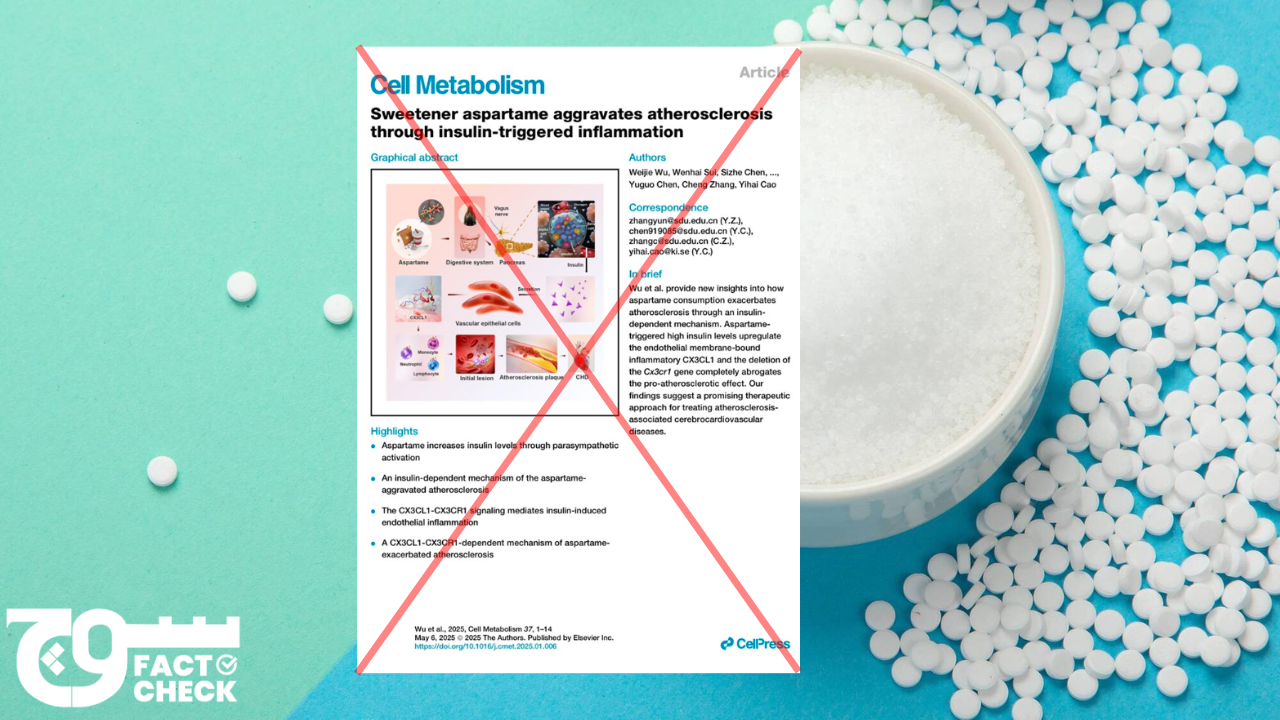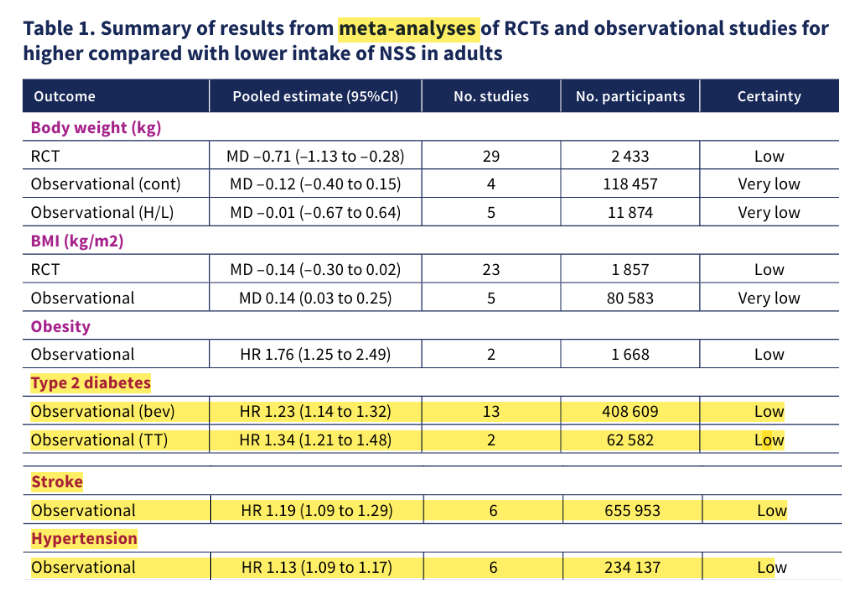
Claim: The artificial sweetener aspartame can worsen the cardiovascular condition atherosclerosis through insulin-triggered inflammation.
Fact: Aspartame has not been conclusively found to worsen this condition; the findings were experimental and lacked firm evidence.
Many X users have posted various claims when it comes to the health risks of consuming aspartame.
On 20 February 2025, an X user posted an image (archive) of a cover page of a study relating to aspartame. The post was captioned,
“Sweetener aspartame aggravates atherosclerosis through insulin-triggered inflammation.
“Our findings suggest a promising therapeutic approach for treating atherosclerosis-associated cerebrocardiovascular diseases.”
Aspartame
Aspartame is an artificial sweetener commonly used as a replacement for sugar, which was discovered in 1965. This sweetener is low in calories and is approximately 200 times sweeter than sugar. Due to its sweet taste and low calorie content, it is often consumed by consumers concerned with weight, sugar consumption, heart disease, and diabetes. It is used to sweeten a variety of foods from diet beverages, chewing gum, ice cream, sweets, breakfast cereals, etc.
Aspartame is one of the most studied food additives in the human food supply, with the United States Food and Drug Administration alone conducting and reviewing over 100 studies. Food safety authorities around the world have independently and extensively reviewed the additive and concluded it is safe to consume, including:
- United States Food and Drug Administration (USFDA)
- European Food Safety Authority (EFSA)
- Food Standards Australia New Zealand (FSANZ)
- United Kingdom Food Standards Authority (UKFSA)
- Canadian Food Inspection Agency (CFIA)
Fact or Fiction?
The claim that the sweetener aspartame causes a litany of diseases has been commonly shared online. For the sake of density, Soch Fact Check will only investigate the studies and claims made in the cited post.
The first claim relates to a recent study released by Cell Metabolism, a monthly peer-reviewed scientific journal. The study was titled, “Sweetener aspartame aggravates atherosclerosis through insulin-triggered inflammation”, this title was included in the viral claim. Essentially, the title of the study and claim state that insulin, a hormone secreted by the pancreas that helps regulate blood sugar levels, can be inflamed and triggered by the consumption of aspartame. This inflammation then worsens atherosclerosis, a condition where plaque (made up of fat, cholesterol, and other substances) builds up inside the arteries, narrowing them and restricting blood flow. Over time, this can lead to serious cardiovascular problems, such as heart attacks or strokes.
However, the cited study does not conclusively prove that aspartame does carry this risk, as Soch Fact Check found several limitations within the study, which prove the results cannot be totally relied upon.
For starters, the study was an animal study performed on mice, not humans. This significantly limits the scope of the results as acknowledged by the report in its“Limitations of the study” section (pg 11), where it states, “this animal model may not fully be relevant to the onset and development of human atherosclerosis.” because the mechanisms of atherosclerosis differ in both as cited by the study
Additionally, while the study noted an exacerbation of atherosclerosis after the mice were fed aspartame, it could not prove the mechanism of worsening i.e. was the exacerbation truly caused by aspartame or a confounder that the research team was not aware of. As the study states, “the molecular mechanism was not fully elucidated in this study”(pg 10), and “according to our current data, we cannot exclude other mechanisms”(pg 11). This means that while this change was reported, those performing the study could not prove that the consumption of aspartame was the cause of this change, nor could they chart the interacting parts and processes that produced this effect in the mice.
All of this is to say that while it was noted that the mice were consuming aspartame and their atherosclerosis worsened, researchers cannot tell you if it happened because of the consumption of aspartame or even how aspartame could cause this.
The results found in the mice were further compromised as the mice were fed a cholesterol and fat-rich diet, a diet that could increase atherosclerosis, as the study itself states, “feeding mice with a high-fat, high-CHOL diet also diminishes clinical relevance” (pg 11).
The study also assumes that primates modulate and secrete insulin in the same manner as rodents, writing, “It seems that this mechanism commonly occurs in rodents and primates”, (pg 10). It further asserts that “a similar regulatory mechanism of insulin secretion most likely also exists in humans”.
Thus, the study operates on the belief that aspartame could produce the same results in primates as mice, as they wrote, “In support of this notion, we show that APM effectively induces insulin secretion in both mice and monkeys.”
However, the study could not prove this with an animal study on monkeys, as it states, “in the monkey model, owing to technical difficulties and feasibilities, our current work did not include the impact of APM on atherosclerosis” (pg 11).
The function of studies with inconclusive results like this is to provide experimental evidence, which encourages further studies. It is not to be used as a new guideline or to discourage consumers. Thus, Soch Fact Check finds the claim to be misleading.
In July 2023, the World Health Organization (WHO) released its updated guidelines related to the consumption of aspartame. This guideline is based on a systematic review of meta-analyses and studies of aspartame. A systematic review is a research method that evaluates all relevant research on a specific topic, usually answering a research question. This guideline noted there was low certainty that aspartame caused cardiovascular diseases or insulin-resistant diabetes.

The WHO report concluded that the previous guidelines, which had established an acceptable daily intake of 0–40mg/kg body weight for aspartame, were acceptable. This daily allowance of 40mg/kg means that an adult weighing 70kg or 154 pounds would have to consume more than 14 cans of diet soda to exceed the limit set.
Virality
Soch Fact Check found the claim on X here and here.
Conclusion: Aspartame has not been conclusively proven to cause insulin-triggered inflammation and the worsening of cardiovascular conditions like atherosclerosis.
To appeal against our fact-check, please send an email to appeals@sochfactcheck.com
